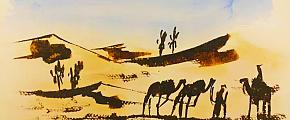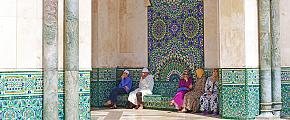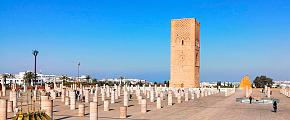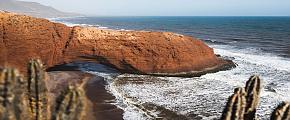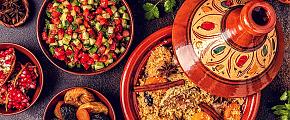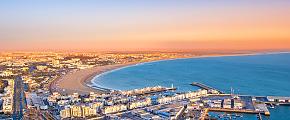Moroccan Dirham Guide: Where to Exchange Money & How to Pay
Knowing basic information about its currency will offer some inspiration for your Morocco vacation, as it is a cash-dominated country. This article will provide you with comprehensive answers, helping you navigate denominations of Moroccan dirham, where to exchange money, payment methods, and more practical tips.
What Is Morocco Currency
The name of the Moroccan dirham comes from the ancient Greek "drachma". Morocco began to use the dirham as its main currency in 1974, issued by Bank Al-Maghrib (the bank of Morocco). 1 dirham is divided into 100 santimat.
The Moroccan dirham is a non-convertible currency. For tourists traveling to Morocco, it is recommended to obtain dirhams at local legal exchange points. Here's a table showing information about dirham.
Currency | Moroccan dirham |
Symbol | د.م (Arabic) / DH (Latin) |
Abbreviation | MAD |
Banknotes | 20 dirhams (purple) 50 dirhams (green) 100 dirhams (brown) 200 dirhams (blue) |
Coins | 10 santimat 20 santimat ½ dirham 1 dirham 5 dirhams 10 dirhams |
Exchange Rates
The following table shows the exchange rates of major foreign currencies against the Moroccan dirham (MAD), including the US dollar (USD), British pound (GBP), Australian dollar (AUD), euro (EUR), Canadian dollar (CAD), and New Zealand dollar (NZD). These data provide you with an intuitive reference, but please note that the exchange rate may fluctuate depending on the location and time, so it is recommended to check it in real time. (Update in January 2025)
Foreign Currency Value | Value in Moroccan Dirham |
1 US Dollar | 10.1 Dirhams |
1 British Pound | 12.68 Dirhams |
1 Australian Dollar | 6.28 Dirhams |
1 Euro | 10.52 Dirhams |
1 Canadian Dollar | 7.03 Dirhams |
1 New Zealand Dollar | 5.68 Dirhams |
Should You Exchange Money in Advance
The Moroccan dirham is a non-convertible currency, which means it can only be exchanged in Morocco. Euros, US dollars, and British pounds are easily exchanged in Morocco at a friendly exchange rate. It is recommended to carry these major currencies and exchange them for dirhams at the airport, bank, or legal exchange point.
Some foreign currencies such as Scottish pounds, Australian dollars, Canadian dollars, and New Zealand dollars may not be directly exchanged. It is recommended to confirm whether your currency can be exchanged in Morocco before departure, or choose more common foreign currencies such as US dollars and euros.
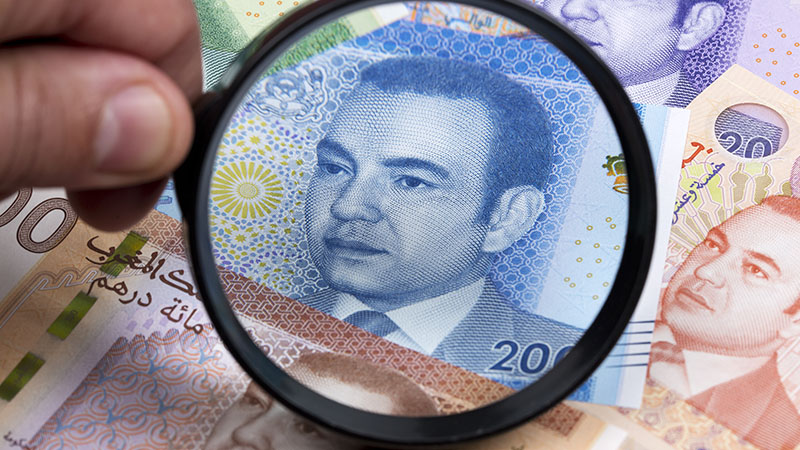 Moroccan Dirham in a Magnifying Glass
Moroccan Dirham in a Magnifying Glass
Where to Exchange Money in Morocco
Airports
Airports are convenient places to exchange money, with official "Bureaux de Change" exchange points, but the exchange rate is usually high and suitable for small emergency exchanges.
Banks
Banks are safe and reliable places to exchange money, providing transparent exchange rates and receipts. But pay attention to their business hours in Morocco, usually during working hours from Monday to Friday 8: 15 am to 16: 30 pm.
Exchange Offices
There are many "Bureaux de Change" exchange offices in cities like Rabat, Marrakech, and Casablanca, which usually have good exchange rates and simple procedures, making them common choices.
Hotels
Some high-end hotels offer currency exchange services, but the exchange rate may not be as cost-effective as banks and exchange offices, so it is suitable for emergency use.
ATM Withdrawals
You can withdraw cash directly from ATMs using international credit or debit cards, which is convenient and fast, but you need to be aware of possible fees and exchange rate differences. Some ATMs in Morocco only accept four-digit personal identification numbers (PINs), so it is advisable to contact the bank in advance to deal with the PIN setting issue.
Payment Methods
Cash Payment
Cash is the most common payment method in Morocco, especially in markets, small shops, and street vendors. It is recommended to carry small amounts of cash (such as 20 or 50 dirhams) for transactions, as large banknotes may be difficult to change.
Credit and Debit Cards
Most high-end hotels, large restaurants, and shopping malls accept credit cards such as Visa and MasterCard. Some small merchants may charge an additional fee when using them, so it is best to confirm before making a payment.
Digital Wallets
PayPal is commonly used on some online booking platforms, while Apple Pay and Google Wallet can be used in a few international stores, but the overall coverage in Morocco is limited.
Bank Transfer
For high-value transactions such as hotel reservations or private car charters, some merchants may accept bank transfers, but be aware that the fees are high and the processing time is long.
Traveler's Checks
Traveler's checks are uncommon and difficult to exchange in Morocco, so it is not recommended to carry them.
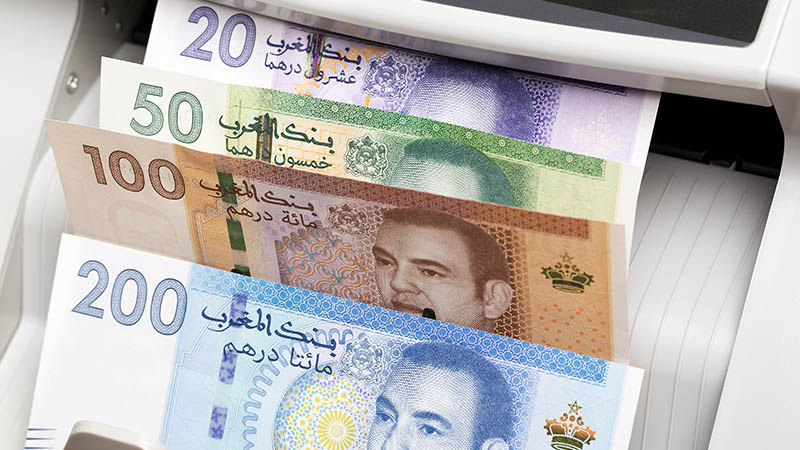 Moroccan Dirham in a Counting Machine
Moroccan Dirham in a Counting Machine
Is It Better to Use Cash or Card
When traveling in Morocco, it is convenient to use a combination of cash and credit cards: cash for small daily purchases and credit cards for larger payments or emergencies. Having the right payment methods ready in advance can make your trip easier.
Cash Is More Widely Used: Cash is the main payment method in Morocco, especially in markets, small shops, street vendors, and taxis, so it is very necessary to carry some dirhams with you.
Credit Cards Are Suitable for High-End Places: Credit cards are widely accepted in high-end hotels, large shopping malls, and high-end restaurants, but may not be accepted in small merchants and remote areas.
Useful Tips in Morocco
Tipping
Tipping is common in Morocco, especially in restaurants, bars, and cafes. Usually, you can tip 10%-15% of the bill. If the bill is smaller, you can give a fixed amount, such as 10-20 dirhams.
Is 100 dirhams a good tip?
In Morocco, 100 dirhams (about 10 dollars) is a substantial tip, usually for a good guide or full-day private driver service. For simple services, such as carrying luggage at the hotel, 20-30 dirhams are enough to show your appreciation.
Haggling
In Morocco's markets and small shops, bargaining is a trading habit. Shopkeepers usually give a high starting price, and you can negotiate to reach a price that both parties are satisfied with. An interesting tip is that Moroccans usually shake hands to formally complete the transaction, which is a traditional and friendly way. Remember, keep a smile and be patient when bargaining for better results.
Prepare Some Small Cash
It is best to have some small cash on hand, such as 20 or 50 dirham notes or coins. Many small vendors cannot make changes for large denominations (such as 200 dirhams), especially in remote areas. In addition, change is very useful when tipping or paying small expenses.
Be Aware of the Exchange Rate and Fees
You should pay attention to the exchange rate difference and fees when exchanging money. Some merchants may charge additional fees when swiping cards. In order to avoid unnecessary losses, it is recommended to confirm in advance before payment. At the same time, pay attention to foreign currency conversion fees for international cash withdrawals or purchases.
Plan Your Morocco Tour With Odynovo
Are you ready to start your trip to Morocco? Plan your trip now, and your next wonderful memory starts here! Odynovo will customize a unique travel experience based on your needs and preferences. Don't hesitate to contact us or send an email to [email protected].
Quick Question
Related Posts You May Like
What Our Clients Say
Explore the latest verified reviews of Odynovo's travel services on Tripadvisor, Google, Trustpilot, Product Review and more trusted platforms.
SUBSCRIBE TO WIN A FREE TOUR
Subscribe to our newsletter for a chance to win a free 7-day tour to India! And more insider travel news, exclusive offers, and inspiration will be sent straight to your inbox. Check our previous newsletters and get some sparks.


